The rain lashed against the battered roof of my old Mini with such fury that night, as though it meant to hammer through the metal and wash me away into the gutters of London. Each drop felt like another cruel blow to the anvil of my faterelentless, deafening. I had just fled the sterile, death-scented purgatory of the hospital, where yet another weary doctor had shaken his head, refusing to operate on my mother. The sum he named wasnt just impossibleit was a mockery, a reminder of the chasm between people like me and those for whom such numbers were mere pocket change.
A year of fighting my mothers illness had hollowed me out. I was no longer myselfjust a shadow, a ragged thing with three jobs, drowning in debts and loans no bank would extend. Despair had become my constant companion, its taste like rust on my tongue, unshaken by food or tears.
And in that moment of utter emptiness, as I sobbed against the steering wheel, the phone rang. Aunt Lydia, persistent as a moth to flame, had found her prey. Her voice, sharp and businesslike, cut through the silence.
“Listen, Annie, stop that sniveling!” she snapped before I could speak. “Im throwing you a lifeline. Catch it. The Harringtons. Wealth like you cant fathom. And their son well, hes an invalid. After a terrible accident. Cant walk, barely speaks. Theyre looking for a nurse. Young, sturdy, presentable. But not just a nurse a wife. In name only. For appearances, for care, so it seems his own family tends to him. Theyll pay. Very, very handsomely. Think about it.”
It didnt smell like a dealit smelled like selling my soul. But the devil offering it held my mothers life in his palm. And what did honesty offer me? Poverty, humiliation, and a lonely, pitiful funeral for the only person I loved.
For a week, I wrestled with doubt, but fear for my mother outweighed everything. And so I found myself standing in the center of their mansions grand hall, a speck on polished marble. The air was cold, sterile, smelling of money and emptiness. Crystal chandeliers, portraits of stern ancestorstheir eyes boring into me, judging my cheapness. And there, before the vast window where the same rain still raged, sat *him*. Thomas Harrington.
He was confined to a wheelchair, his body frail beneath his clothes. But his face his face was arrestingly handsomesharp cheekbones, dark brows, tousled hair. Yet it was expressionless, like carved stone. His empty gaze fixed on the rain-soaked gardens, though he seemed to see nothing, lost somewhere beyond reach.
His father, Charles Harrington, silver-haired and immaculate in his tailored suit, assessed me in one piercing glance. I felt like livestock at auction.
“The terms are clear, I presume?” His voice was smooth, cold as steel. “You marry my son. Legally. You tend to him, stay by his side, ensure his comfort. No marital obligations beyond appearances. Youre a companion, a nurse wrapped in a wifes title. In a years timea substantial sum in your account, and your freedom. A months trial. Fail, and youll be compensated for your time and dismissed.”
I nodded, nails biting into my palms. I searched Thomass eyes for any spark, any flicker of awareness. Nothing. He was just a beautiful, living dollpart of the decor.
The wedding was quiet, joyless, a grim pantomime. My new room was spacious but lifeless, adjoined to his quarters. My days became a monotonous ordeal: spoon-feeding him, the humiliating rituals of care, silent walks in the gardens, reading aloud to a man who never responded. He seldom stirredonly a faint moan in sleep, the occasional twitch of a finger. I grew used to his silence, his hollow stare. I pitied him, this young, beautiful man trapped in a ruined body. I began talking to himconfessing my fears, my grief for my mother, as though he were a diary that could never answer.
But after a month, something shifted. Reality began to crack.
One evening, as I carried in his supper, my heel caught on the edge of an ornate Persian rug. I stumbled, nearly fallingand from Thomas came not the usual groan, but a sharp, unmistakable gasp of alarm. I froze, staring. His face remained blank. My imagination, I told myself.
The next morning, my favorite hairpinmy one bright possession in this dreary placewas missing. I tore the room apart. That night, as I settled Thomas into bed, I found it. Resting on his nightstand, on the side I never touchedplaced there neatly, deliberately. I blamed exhaustion.
Then, the book. Id been reading him *Pride and Prejudice* when the hospital called about my mothers tests. I tucked the book into his drawer to save my place. The next morning, it lay on the breakfast tray, open to the exact pagemarked with a jade lizard brooch Id never seen before. My hands shook. This was no accident.
So began my quiet war. I watched. I feigned sleep, misplaced objects, murmured things only he could confirmif he heard, if he understood.
“Those roses by the old oak must be lovely this time of year,” I remarked one day while massaging his stiff fingers. In truth, the bed there was overgrown with weeds.
The next evening, his father mentioned casually to the gardener, “Well plant roses by the oak. Fine idea.”
Ice slithered down my spine. This was no delusion. It was a conspiracy.
The revelation came late one night. A faint rustling from his room. I crept to the door, easing it openmoonlight slicing across the empty bed. My heart plummeted. I nearly screamed, but thena scrape of wood. From his fathers study.
Through the cracked door, I saw him. *Thomas.* He stood at the desk, gripping it with white-knuckled hands, his back bare, muscles taut with strain. Sweat glistened as he whispered feverishly to papers strewn before him. This was no invalidthis was a man of fury, of focus, trapped in a cage of his own flesh.
I recoiledthe floor creaked.
He stilled. Turned. Slowly, agonizingly, his eyes met mine. No emptiness nowonly raw, animal terror. We stared, frozen. He knew he was caught. I knew Id seen what could get me killed.
He staggered forward, gripping a chair. “Dont speak,” he rasped, voice rusty from disuse. Not a pleaa command, primal and deadly.
Then, shadows moved behind me. His father stood in the doorway, velvet-robed, unshaken. In his handnot a weapon, but a thick, worn folder. Somehow worse.
“Our little bird has flown too far,” he said calmly. “Come inside, Annie. Lets talk.”
I stepped into the study, legs weak. Thomas collapsed into a chair, every muscle trembling. The charade was over.
Charles Harrington laid it bare. The accident that had crippled Thomas was realbut the true injury wasnt his spine. It was his mind. And the girl whod died in that crashhis fiancée, Lillian. Her father, Victor Crowe, blamed Thomas. Believed hed been driving. His vengeance was relentlesscorporate sabotage, ruined reputations. And if he learned Thomas was healing
“A hired knife isnt a metaphor for him,” Charles said heavily. “Its a promise.”
I was the decoy. A young, penniless wife drew eyes away from Thomass recovery. My presence made the lie airtight.
Id sold myselfnot to eccentric rich men, but to a war where lives were stakes.
A year passed in tension and deceit. Thomas relearned to walk in secret, each step a battle. I stood guard, his silent ally.
Thenthe trap. Crowes assassin came one night, slipping onto the balcony. A syringe in hand. We were ready. Light blazed; guards seized him. Crowes empire crumbled with his arrest.
And now, the end. Divorce papers. A checkmore than promised.
“Stay,” Charles urged, aged by gratitude. “All this could truly be yours.”
Thomas stood by the fireplace, leaning on a cane. His eyes held something deep, unspoken.
“No,” I said softly. “I came to save my mother. Were square.”
I took the checknot payment for my year, but for her future. My own, Id build honestly.
As I left, Thomas called out, voice rough but clear: “Thank you.”
Outside, snow fellclean, new. The air smelled of freedom. I had nothing. And everything.







